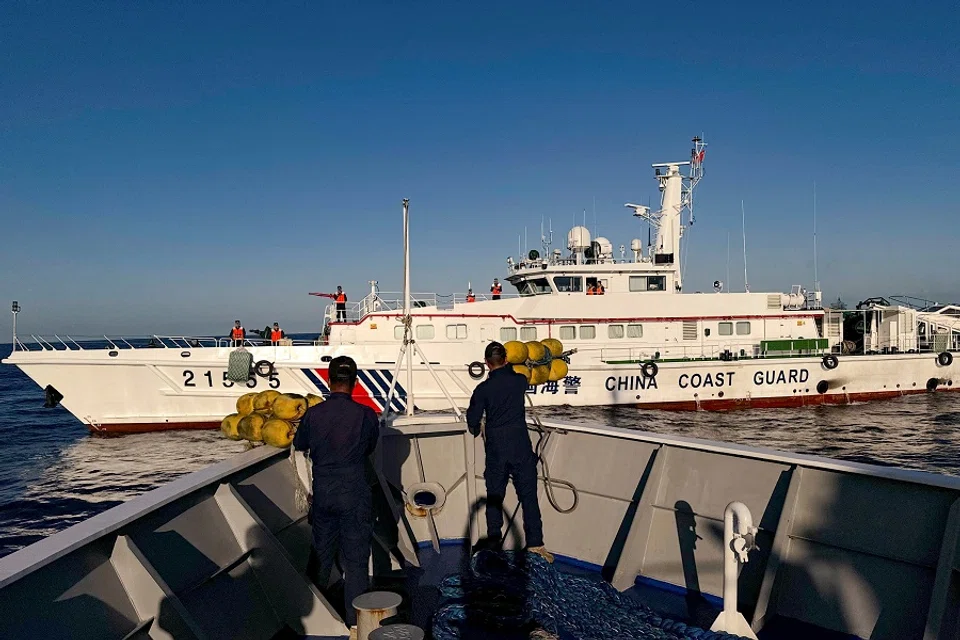Would Marcos's dialogue promises bring peace and stability to the South China Sea?
The joint military exercises that the Philippines has conducted with the US and its allies have not only failed to decrease China's "offensives" but also incited its "aggressiveness", says Chinese academic Peng Nian.

On 8 April, Philippine President Marcos Jr stated in an interview with reporters in Bacolod city, Negros Occidental, that the Philippines remains committed to maintaining open communication with China and is making every effort to engage with the Chinese leadership to deescalate tensions in the South China Sea (SCS).
He further clarified that the joint military drill conducted by the US, Japan, Australia and the Philippines in the SCS was aimed at strengthening coordination between the four navies. He also said that the exercise would help deter aggression of Chinese Coast Guard (CCG) ships in the area.
Following the US's lead
This is the most recent statement by Marcos on SCS disputes and is quite different from his previous harsh position, as he appears to have adopted a more conciliatory tone to pursue peace and stability in the SCS. Why? The main reasons are: one, to be in step with the US's resumption of military exchanges with China, and two, to reduce war anxiety at home.
... in the tradition of bandwagoning, the Philippines followed the US and took measures to reduce tensions with China.
It is worth noting that recently, the Chinese People's Liberation Army (PLA) and the US Army have resumed security consultations after a hiatus of some time. This sends a clear message that both giant rivals, the US and China, fully realise the high risks of military confrontation, either in the SCS or in the Taiwan Strait, and are committed to preventing the crisis from escalating to clashes and even war. Therefore, in the tradition of bandwagoning, the Philippines followed the US and took measures to reduce tensions with China.

Nonetheless, neither the US nor the Philippines have given up their deterrence strategies toward China. Instead, they have taken more military action to deter China's "offensives" in the SCS.
This can be inferred from the views of the Armed Forces of the Philippines, which stated that the main objective of the US-Japan-Australia-Philippines military exercise was to demonstrate "the participating countries' commitment to strengthen regional and international cooperation in support of a free and open Indo-Pacific through interoperability exercises in the maritime domain". Philippine officers have also said that they need more joint military exercises with their allies and partners in the future.
China responds with combat patrols of its own
However, such so-called "military deterrence" has failed to compel China to retreat from the SCS. In response, China has in fact strengthened its military combat readiness in the SCS, such as by conducting the recent joint naval and air combat patrol conducted by the Southern Theater Command on 8 April, the same day as the US-Japan-Australia-Philippine military exercise.
Hence, the joint military exercises that the Philippines conducted with the US and its allies, either bilaterally or multilaterally, have not only failed to decrease China's "offensives" but also incited its "aggressiveness".

Since the escalation of tensions in the SCS, war anxiety over SCS disputes has prevailed in Philippine society. More recently, Imee Marcos, sister of Marcos Jr and chair of the Philippine Senate Committee on Foreign Relations, voiced her disagreement with the Marcos government's recent measures to counter China in the SCS, arguing that such actions were leading the country "down a dangerous path". Therefore, Marcos had to placate his critics by sending peace messages.
... this is a typical tactic employed by Marcos in attempting to seize the moral upper hand.
The Philippines' attempts to take the moral high ground
In fact, it is not unprecedented for the Philippines to issue statements seeking dialogue with China after provoking it. In other words, this is a typical tactic employed by Marcos in attempting to seize the moral upper hand. This approach is designed to portray the Philippines as a peaceful advocate, while China is described as an "aggressor" and to shift the blame for tensions and conflicts to China.
An instance of this tactic could be seen from the telephone call between foreign ministers of China and the Philippines in December 2023 and the 8th Bilateral Consultation Mechanism on the South China Sea (BCM) meeting in Shanghai in January this year.
The Philippines initiated a request for dialogue during the call, and China responded positively by actively promoting it. However, the Philippines subsequently backtracked from its commitments and persisted in provocative actions, resulting in the situation in the SCS deteriorating even further compared to that of the previous year.

Now, Manila seems to be repeating this tactic. If the Philippines truly aims to resume dialogue with China to de-escalate tensions in the SCS, it must stop holding military exercises with extra-regional countries and stop making provocations in the disputed waters.
... it is challenging for China to have full faith in Marcos's sincerity regarding bilateral dialogue.
Jeopardising Beijing-Manila trust
The first joint exercises between the four navies of the Philippines, the US, Japan, and Australia have not only heightened SCS tensions but also further undermined the political trust between China and the Philippines. Such military actions are incompatible with creating a conducive atmosphere for the resumption of dialogue between the two countries, and it is challenging for China to have full faith in Marcos's sincerity regarding bilateral dialogue.
Even worse, there will be more diplomatic and military actions between the Philippines, the US and Japan in the next few days, mainly including the first US-Japan-Philippine leaders summit on 11 April and the annual "Balikatan" exercise between the US and the Philippines on 22 April- 8 May, which will definitely escalate tensions in the SCS.

Although the Philippines could place greater pressure on China and secure greater benefits from closer alignment with the US and Japan, such a selfish approach is highly dangerous and risky and jeopardises Beijing-Manila trust.
To date, the SCS dispute has been edging closer to the brink of military confrontations; there are fewer effective measures to halt this momentum. Thus, the self-restraint of all claimants and external actors and the resumption of peace talks between China and the Philippines are needed more than ever. It is imperative that the Philippines stops its provocations and returns to the dialogue track.



![[Photos] Fact versus fiction: The portrayal of WWII anti-Japanese martyrs in Taiwan](https://cassette.sphdigital.com.sg/image/thinkchina/3494f8bd481870f7c65b881fd21a3fd733f573f23232376e39c532a2c7593cbc)

